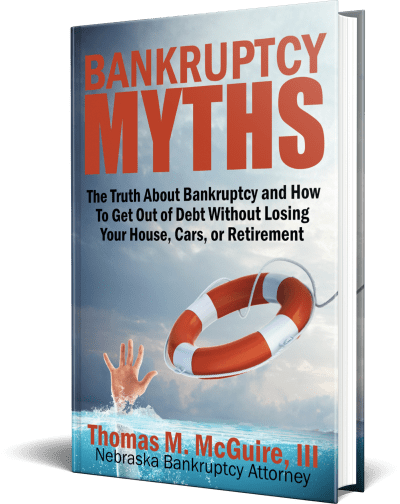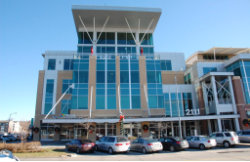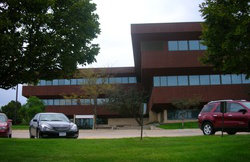Chapter 13 Bankruptcy
Find a Chapter 13 Reorganization Bankruptcy Lawyer in Omaha, Lincoln, or Grand Island
If you can no longer afford to pay your debts due to financial hardships like job loss, unforeseen medical expenses, or divorce, Chapter 13 bankruptcy may be an option to help you gain control of unmanageable debt. With this type of bankruptcy, you can slowly pay back some debts over an extended period. With the help of a bankruptcy lawyer, you can reduce the amount of monthly debt payments you make and simplify it into one payment so you can regain your financial footing.
If you are considering filing Chapter 13 bankruptcy, McGuire Law Offices is here to help you from start to finish. Read on to learn more about Chapter 13 bankruptcy and then reach out to us for help.
What Is Chapter 13 Bankruptcy?
Chapter 13 bankruptcy is sometimes referred to as a “reorganization” or “wage earner’s plan.” With this type of bankruptcy, you establish a repayment plan that gives you relief from creditor harassment while reorganizing and paying back a percentage of your debts with monthly payments over three to five years. You make payments to a Chapter 13 trustee, who receives the payments, divides them up, and pays your creditors on your behalf. After the term of your plan concludes, any remaining debts that were part of the bankruptcy are discharged.
In Chapter 13 bankruptcy, your debts are separated into the following categories:
- Priority – Priority debts are the most important types of debts and must be paid back in full as part of the Chapter 13 bankruptcy. These debts include child support, spousal support payments, and back taxes.
- Secured – Secured debts have property or other collateral attached to them that a creditor can take if you fail to repay them. Secured debts include mortgage arrears and auto loans.
- Unsecured – Unsecured debts do not have any collateral attached to them and include things like credit card debt, medical bills, and student loans.
A repayment plan will be worked out with your existing creditors to reorganize and pay off a portion of your debts. Generally, you will pay off your priority debts. Secured debts besides regular mortgage payments are paid through the Chapter 13 plan. Only mortgage arrears are paid through the Chapter 13 plan. You may also pay off a portion of your unsecured debts as part of your repayment plan, with the remaining debts discharged at the end of the process.
Learn The Truth About Bankruptcy And How To Get Out of Debt Without Losing Your House, Cars, or Retirement

Bankruptcy Attorney Thomas M. McGuire reveals five bankruptcy myths that keep people drowning in debt and afraid to claim the fresh start they deserve.
Learn The Truth About Bankruptcy And How To Get Out of Debt Without Losing Your House, Cars, or Retirement

Bankruptcy Attorney Thomas M. McGuire reveals five bankruptcy myths that keep people drowning in debt and afraid to claim the fresh start they deserve.
Benefits of Chapter 13 Bankruptcy
Some of the benefits of Chapter 13 bankruptcy include:
- You can keep your property – Unlike with a Chapter 7 “liquidation” bankruptcy, you generally get to keep all of your property with a Chapter 13 bankruptcy. In Chapter 7, creditors are paid back from the proceeds of selling your non-exempt property. In Chapter 13, creditors are paid back from your monthly repayment plan, so there is no need to sell off your property.
- You can simplify payments – In Chapter 13 bankruptcy, creditors are listed into categories (as described above) and paid according to the plan. Your bankruptcy plan payments are primarily based on what you can afford to pay. You may not be able to pay all your creditors. In some situations, your debt is “crammed down” to a lower amount than what you owe. You are ultimately responsible for one consolidated payment each month that the trustee uses to distribute funds to your creditors, pursuant to the Chapter 13 plan. Any eligible debt that is included in the Chapter 13 bankruptcy that is not paid off after your plan expires is generally discharged.
- You can avoid foreclosure – Filing a Chapter 13 bankruptcy will stop a foreclosure sale and allow you to stay in your home, provided that you resume your mortgage payments and make your Chapter 13 plan payments to the Trustee. The debtor pays the mortgage arrears (back payments) through the Chapter 13 Plan.
- You can work in other debts – While you can’t discharge certain debts like delinquent taxes or child support arrears, you can include these in your bankruptcy filing so that you have more time to pay them off and to halt collection efforts.
Qualifying for Chapter 13 Bankruptcy
To qualify for Chapter 13 bankruptcy discharge, you must meet the following eligibility guidelines:
- You earn a regular income.
- You have less than $419,275 in unsecured debt and less than $1,257,850 in secured debt, as of 2021.
- You are current on your tax returns.
- You have not received a discharge for Chapter 13 bankruptcy within the past two years or a Chapter 7 bankruptcy within the past four years.
Get A Free Bankruptcy Evaluation Today
Call (402) 965-0775 or (308) 221-8222 or click here to submit a consultation request form now.
Get Help Now
Debts that Can Be Discharged Through Chapter 13 Bankruptcy
A variety of debts can be discharged through Chapter 13 bankruptcy, including:
- Credit cards
- Medical bills
- Personal loans
- Past-due utility bills
- Certain tax debts
- Divorce property settlements
In limited cases, student loan debt may be eligible for discharge in bankruptcy, but you must be able to prove that repaying it would cause an “undue hardship” on you.
Debts that generally cannot be discharged through bankruptcy include:
- Child support or alimony payments
- Recent tax debts
- Debts stemming from lawsuits or criminal penalties for cases involving drunk driving, fraud, or willful or malicious behavior
- Debts you did not include in your repayment plan
What Is Involved in Chapter 13 Bankruptcy?
These steps are involved in obtaining Chapter 13 bankruptcy relief:
- Attend a credit counseling course – You must take a credit counseling class within 180 days of filing your bankruptcy petition.
- Prepare the petition – A knowledgeable bankruptcy lawyer can help prepare your petition for bankruptcy. This involves accurately listing your assets, income, and debts.
- Present a payment plan – Your lawyer can prepare a plan for paying your creditors back over three to five years and present your creditors with this plan.
- Appointment of Chapter 13 Trustee – The Court will appoint a bankruptcy trustee to help manage your case. The trustee is responsible for collecting payments from you and distributing them to your creditors.
- Attend a Hearing with Chapter 13 Trustee
- Take a Personal Financial Management Class – This course can be taken by phone or internet.
- Make Payments to Chapter 13 Trustee – You will make payments for 3-5 years.
- Receive Your Discharge – Once payments are complete you will receive your discharge.
Chapter 13 Bankruptcy FAQs
Chapter 13 is a “reorganization” or “wage earners” plan that allows you to reorganize your debts via affordable monthly payments. Unlike a Chapter 7 plan, you will need to make ongoing monthly payments. At the end of the plan term, any remaining debt is discharged. You typically pay what you can afford to pay over the three to five year period. You are making your best effort to pay something back.
You are not legally required to have a bankruptcy lawyer. However, Chapter 13 bankruptcy takes more time to complete and is often more complex than Chapter 7. Therefore, many people do hire a lawyer to help them with their Chapter 13 bankruptcy. A bankruptcy lawyer can educate you about the process, determine if Chapter 13 bankruptcy is right for you, answer questions about the process, and help you complete the necessary legal documents and forms. A lawyer can also help you prepare a reasonable budget, communicate with the bankruptcy trustee on your behalf, create an affordable Chapter 13 plan, attend required meetings and hearings, and handle various claims.
Chapter 13 bankruptcy can help you reorganize your debt so you can pay off part of it within a reasonable time period. It may also help you protect your property that you might otherwise lose in a Chapter 7 bankruptcy. Chapter 13 is also cheaper upfront to file than Chapter 7.
Chapter 13 bankruptcy takes much longer than a Chapter 7 bankruptcy, lasting three to five years. You will also have to make ongoing monthly payments during the repayment term.
Chapter 13 bankruptcy has specific eligibility requirements, including:
- You must have a regular source of income
- You must have unsecured debts less than $419,275 and secured debts less than $1,275,850
- You must not have dismissed another bankruptcy case within the last 180 days (with some exceptions)
You have received bankruptcy credit counseling within the last 180 days
Yes. One of the most significant advantages of a Chapter 13 bankruptcy is that it may allow you to stop a foreclosure. When you file for bankruptcy, an automatic stay is put in place that prevents creditors, including secured creditors from taking further collection activities against you. You may be able to roll your mortgage arrears into your bankruptcy repayment plan.
Yes. You can generally keep your vehicle and pay off your car loan through a repayment plan. If the amount you owe on the vehicle exceeds its value, you may be able to reduce the debt to the value. A bankruptcy lawyer can help with this case.
Yes, many Chapter 7 bankruptcy cases can be converted to a Chapter 13 bankruptcy. A lawyer can review your specific situation and explain whether this is an option for your bankruptcy.
The Chapter 13 repayment plan generally last 36-60 months or three to five years. The plan term depends on the amount of debt and your income.
How Can a Nebraska Bankruptcy Lawyer Help with Chapter 13?
If your debts have become unmanageable, Chapter 13 bankruptcy may be an option for you. We can review your circumstances and determine if Chapter 13 bankruptcy is best for you. If you decide to move forward with your bankruptcy, we can help gather information, prepare your bankruptcy petition, and ensure your repayment plan addresses your needs.
Learn more about whether bankruptcy may be the right option for you by contacting our office today.

Free Consultation


